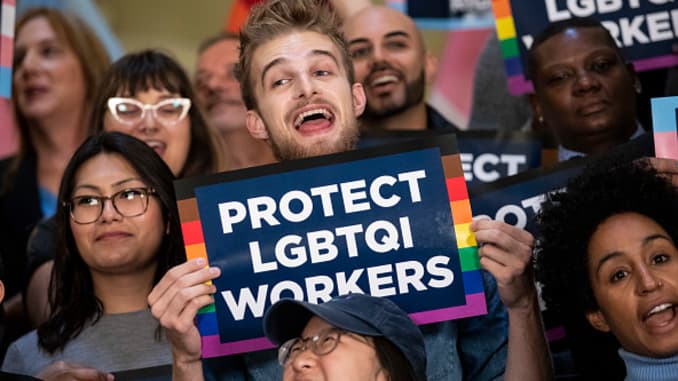Supreme Court rules workers can't be fired for being gay or transgender
Published Mon, Jun 15 202010:06 AM EDTUpdated 7 min ago
Tucker Higgins@in/tucker-higgins-5b162295/@tuckerhiggins
Key Points
- The Supreme Court ruled on Monday that workers cannot be fired for being gay or transgender in a major win for members of the LGBT community.
- The holding is a blockbuster development in the history of gay rights in the United States.
- While workers in about half the country were protected by local laws that prohibit discrimination based on sexual orientation or gender identity, there was no federal law that explicitly barred LGBT workers from being fired on that basis.

Activists rally in support of LGBTQ rights at New York City Hall on October 8, 2019 in New York City. On Tuesday the U.S. Supreme Court will hear three cases on whether it is legal to fire workers because of their sexual orientation or gender identity.
Drew Angerer | Getty Images
The Supreme Court ruled on Monday that workers cannot be fired for being gay or transgender in a major win for members of the LGBT community.
The 6-3 holding, authored by Justice Neil Gorsuch, a conservative appointed by President Donald Trump, is a blockbuster development in the history of gay rights in the United States.
“An individual’s homosexuality or transgender status is not relevant to employment decisions,” Gorsuch wrote. “That’s because it is impossible to discriminate against a person for being homosexual or transgender without discriminating against that individual based on sex.”
While workers in about half the country were protected by local laws that prohibit discrimination based on sexual orientation or gender identity, there was no federal law that explicitly barred LGBT workers from being fired on that basis.
“This decision sends an unambiguous message that equal protection under the law applies to all and that an employee’s failure to adhere to an employer’s gender stereotype is not a licence to discriminate,” Kristen Browde, co-chair of the National Trans Bar Association, said in a statement.
The court’s opinion, which was released only online as a precaution against Covid-19, did not immediately load in its entirety, possibly a result of high traffic to the Supreme Court’s website. READ MORE HERE

